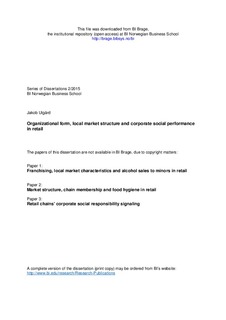| dc.description.abstract | I study how organizational form and local market structure influence retail firms' corporate social performance (CSP). The theoretical model is based on agency theory, which in its origin focuses on the dyad between the principal and the agent. I extend this perspective and examine how characteristics of the environment outside the dyad influence the outcomes. Retail stores vary in their organizational form and thereby in their incentives to maximize profits. I hypothesize that the different incentives, together with differences in monitoring costs and principal demand influence CSP. Further, developments in agency theory have suggested that the local market structure can influence the effects of the chain-store contracts. Competition can give corporate stores stronger incentives to maximize profits, and reputation effects can increase the profitability of CSP. The main contribution of this dissertation is testing these predictions empirically with data on the CSP of retail stores and chains. The dissertation consists of an introduction, three independent empirical articles, and a conclusion.
In the first article (“Franchising, local market characteristics and alcohol sales to minors in retail”) I study how the influence of organizational form (franchised vs corporate store) on CSP depends on competition, market size and public monitoring and sanctions. As the measure of CSP I use the results of alcohol purchase attempts done by underage teens in retail stores. Control variables are collected from other sources. As hypothesized I find that franchised stores are more likely to sell alcohol to minors, and that they are more sensitive to the risk of sanctions. However, I find no relationship between competition and performance, and corporate stores and not franchised stores improve their performance in small markets.
The second article (“Market structure, chain membership and food hygiene in retail”) studies how chain membership and competition influence food hygiene in supermarkets. In Denmark, the “Smiley scheme” makes the results of hygiene inspections by food authorities public. I hypothesize a U-shaped relationship where low and high levels of competition give better quality, since stores with little competition are located in small markets with strong reputation effects. I further hypothesize that chain stores are less sensitive to competition, since chains standardize quality. I get robust support for the U-shaped relationship between competition and quality, but limited support for the lower sensitivity of chain stores to competition.
In the third article (“Retail chains’ corporate social responsibility signaling”) I study how the retail chain's organizational form influences its CSP signaling. I hypothesize that vertically integrated chains are more likely to signal CSP since they have less problems getting their stores to commit to common investments in CSP than other chains. I also include other hypotheses testing signaling theory. The data comes from a content analysis of the web pages of 208 retail chains in the Norwegian market, combined with information from other sources. As hypothesized, I find that franchise chains are significantly less likely and plural and voluntary chains marginally less likely to signal CSP than integrated chains. Two of the other three hypotheses testing signaling theory are supported.
In total, the findings give partial support to agency theory. For the direct effects of organizational form the hypotheses are supported. Franchised stores have lower social performance when monitoring costs are high but there are smaller differences between independent and chain stores when monitoring costs are lower. The chain-store contract also has consequences for CSP at the chain level. For the moderating effects of the local market structure, agency theory is not supported. | nb_NO |
